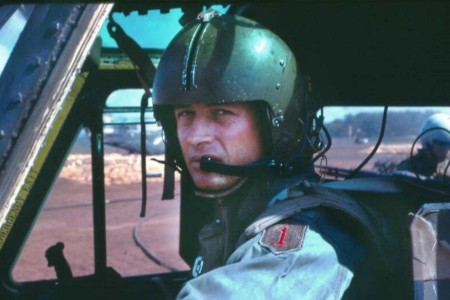
WASHINGTON — Former U.S. Army Capt. Larry L. Taylor, a native of Chattanooga, Tennessee, will receive the Medal of Honor at the White House on Tuesday, Sept. 5, 2023, for his heroic actions and conspicuous gallantry while serving as a helicopter pilot with Troop D (Air), 1st Squadron, 4th Cavalry, 1st Infantry Division, during the Vietnam War in 1968.
On June 18, 1968, then-1st Lt. Taylor was part of a two-helicopter team sent to support a four-man long-range reconnaissance patrol team that had been surrounded and was in danger of being overrun by the enemy near the hamlet of Ap Go Cong, Republic of Vietnam.
Taylor and his wingman, both flying AH-1G Cobra helicopter gunships, took off from their Phu Loi base and arrived at the contact site just northeast of Saigon a few minutes later. After locating the patrol team, Taylor and his wingman conducted low-level attack runs for 45 minutes, strafing the enemy with mini-guns and rockets while braving intense ground fire.
With both helicopters nearly out of ammunition and the enemy closing in on the patrol team, Taylor concluded that the four Soldiers would be overwhelmed if they tried to reach their evacuation point near the Dong Nai River. After learning that another plan to rescue the patrol team using a UH-1 “Huey” helicopter had been canceled, Taylor decided to improvise.
Running low on fuel, with the patrol team nearly out of ammunition, Taylor decided on a bold and innovative plan to extract the team using his two-man Cobra helicopter, a feat that had never been accomplished or even attempted.

Taylor directed his wingman to fire his remaining mini-gun and then return to base camp. He then fired his own remaining rounds while using his Cobra’s landing lights to draw the enemy’s attention while the patrol team headed southeast toward a nearby extraction point Taylor had designated.
When the team reached the site, Taylor landed his Cobra under heavy enemy fire and with complete disregard for his personal safety. The patrol team climbed aboard, sitting on the rocket-pods and skids, and Taylor carried them to a safe location.
Taylor was born in Chattanooga, Tennessee, and is a graduate of the University of Tennessee, Knoxville, where he attended the Army Reserve Officer Training Program. In June 1966, he was commissioned as a second lieutenant in the Army Reserve, then joined the regular Army in August, volunteering as an armor officer.
After graduating from the U.S. Army Armor School at Fort Knox, Kentucky, Taylor quickly realized he was better suited to be a pilot than an armor officer. He had already obtained a fixed-wing pilot’s license before joining the Army and thought that experience would make it easier to learn rotary-wing flying.
After receiving permission to train as a helicopter pilot, he attended the U.S. Army Primary Helicopter School at Fort Wolters, Texas, and then advanced helicopter training at Fort Rucker (renamed Fort Novosel in 2023), Alabama, where he qualified as an Army aviator in June 1967.
Taylor served in Vietnam from August 1967 to August 1968, flying some of the first Bell AH1-G Cobra attack helicopters in combat. He flew more than 2,000 combat missions, flying the Cobra and UH-1 Hueys. He was engaged by enemy fire 340 times and was forced down five times. The Army awarded him at least 50 combat decorations, including the Silver Star, 43 Air Medals, a Bronze Star and two Distinguished Flying Crosses, and he also received the Republic of Vietnam Gallantry Cross with Bronze Star.

For his actions on June 18, 1968, he was awarded the Silver Star, which President Joe Biden upgraded to the Medal of Honor in 2023.
Taylor concluded his military service as a captain with the 2nd Armored Cavalry in West Germany. After his Army service, he operated a successful roofing and sheet metal company in Chattanooga and was involved with several veterans’ organizations. He has also been a generous donor to charitable nonprofit organizations in the Chattanooga area. Taylor and his wife, Toni, reside in Signal Mountain, Tennessee.
The Medal of Honor is awarded to members of the armed forces who distinguish themselves conspicuously by gallantry and intrepidity at the risk of their own lives above and beyond the call of duty. The meritorious conduct must involve great personal bravery or self-sacrifice so conspicuous as to clearly distinguish the individual above his or her comrades and must have involved risk of life, and there must be incontestable proof of the performance of the meritorious conduct.
